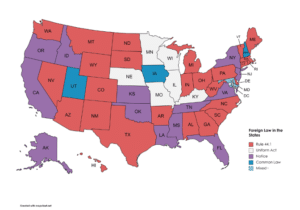Foreign Law in State Courts
June 17, 2025

The Yale Journal of International Law recently published my article, Foreign Law on the Ground. The article is a comprehensive study of the treatment of foreign law in U.S. courts.
Most the prior scholarship on foreign law in U.S. courts has focused on federal courts and Federal Rule 44.1. My article discusses federal courts, but not only federal courts. The article also includes a fifty-state survey of the treatment of foreign law in state courts.
The conventional story is that the treatment of foreign law in U.S. courts evolved in four phases. First, at common law, foreign law was treated as a question of fact. Second, foreign law was treated as a question of fact, but it was assigned to the judge not the jury. This second phase informed the Uniform Interstate and International Procedure Act. Third, foreign law was treated as subject to judicial notice. Fourth, and today in federal court, foreign law is treated as a question of law, assigned to the judge and considered de novo on appeal.
According to a 1935 study, forty-three states treated foreign under the common law, and five permitted its introduction subject to judicial notice. (I will note my continued gratitude to Samuel Wachtell who completed that study using much more labor-intensive research methods than those I had at my disposal.)
My article updates these results. Today, 27 states follow a Rule 44.1-like system of treating foreign law as law. Three states follow the common law, six apply the Uniform Act, thirteen apply judicial notice, and Maryland applies a judicial notice approach to the law of common-law countries and a Uniform Act-like approach to the law of civil-law countries.

Although states are generally moving toward more Rule 44.1-like treatment, that trend is not comprehensive. Both Alaska and Minnesota adopted and then rescinded Rule 44.1-like rules, with Alaska returning to judicial notice treatment and Minnesota courts turning to the Uniform Act.
The difference in treatment of foreign law between federal and state courts, and among state courts, could create challenges for litigants, especially foreign parties and lawyers not familiar with U.S. courts. Indeed, a Uniform Law Commission study committee (announced recently on this blog) is considering whether the treatment of foreign law should be addressed in a new Uniform Act. Stay tuned to TLB for further updates on those efforts.